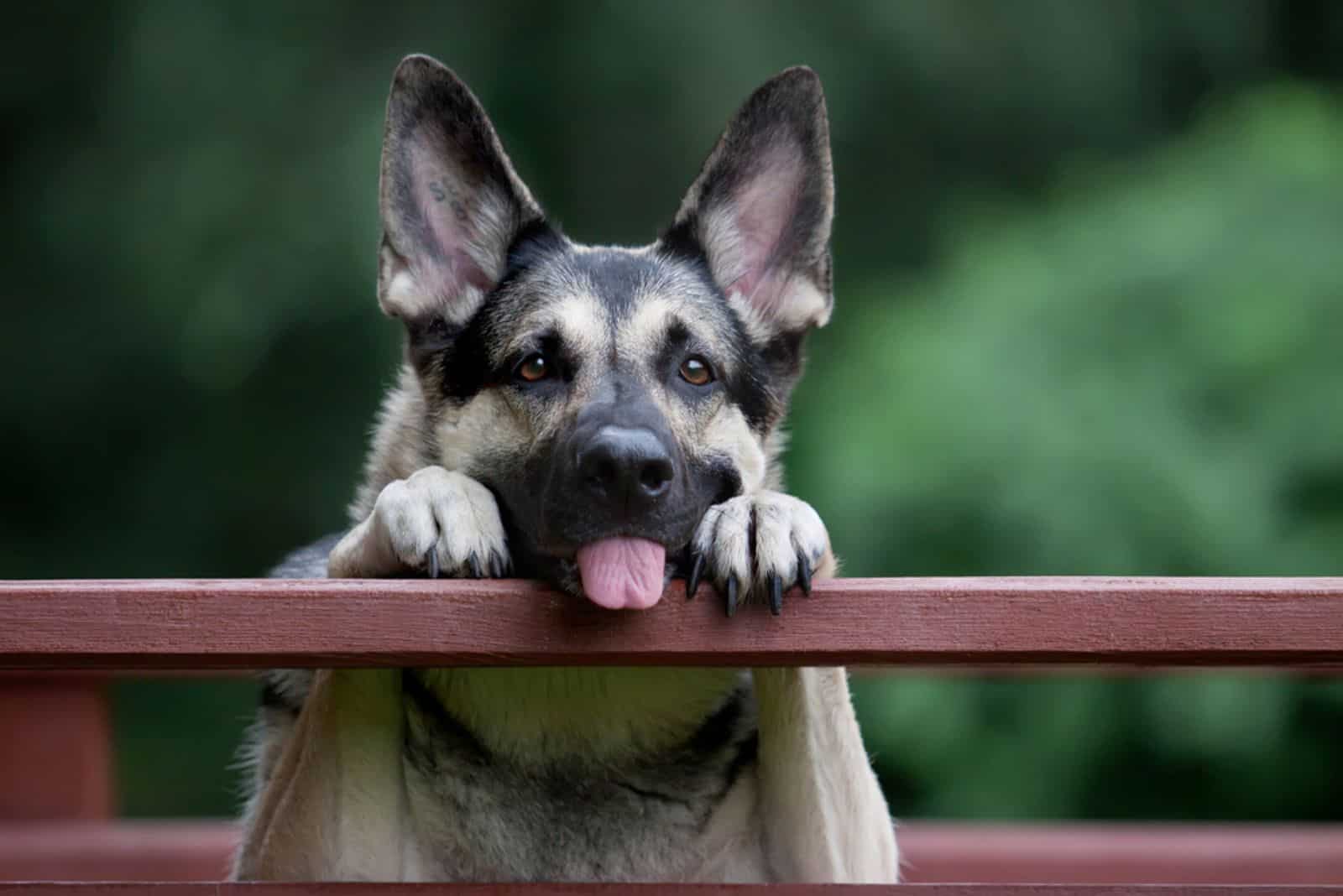We have all seen videos or photos of dogs with their tongues sticking out and, probably, laughed a bit. Not many people ponder on the reasons behind it and move on.
If you are a dog owner, then this will not be as funny to you. Maybe you noticed your canine companion having its tongue stick out more often than usual or the tongue causing pain or discomfort.
Whatever the reason, I am here to help you narrow it down and do something about it. Unless your pooch arrived with a factory defect. I certainly hope it did not. So, why DO dogs stick their tongue out?
Is It Bad If My Dog’s Tongue Sticks Out?
This is the first thing that comes to mind when the tongue suddenly starts hanging where it previously did not. While the cause can be of ominous character, you are most likely seeing the tongue because it is too hot.
If you too feel it is hot and, like me, try one of your dogs’ techniques in desperation, then you will see it does not work on humans. We suck at dissipating heat…
Other reasons can be simply related to the mood the dog is in, breed related or medical. It is time to go through all of them to help you assess the situation and make an informed decision about it.
Why Does My Dog’s Tongue Stick Out? Here Are The Answers
1. Body Temperature Control
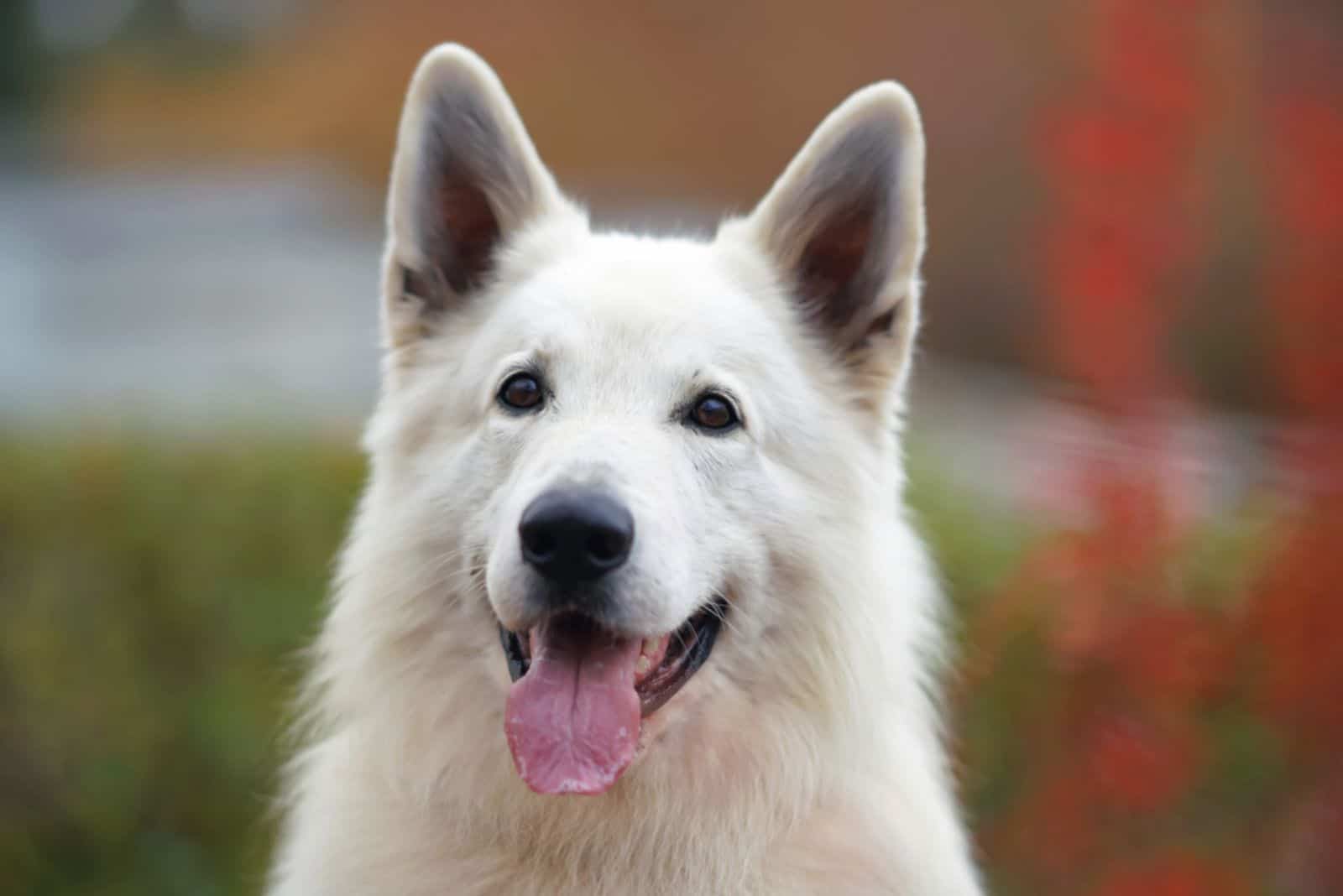
Those summer days can be brutal. While we can use a fan to cool down, sweat it out or splash ourselves with cold water, the dog’s strongest weapon in the fight against heat is panting. Nothing better for keeping cool than finding shade and letting that tongue hang freely.
How does panting work? The dry, warm air that your dog inhales needs to be moisturized to ease the process of water evaporation from the body. The upper respiratory tract and the lungs are your dog’s air conditioning system.
The process of panting is efficient in removing water from the body so plenty of water is necessary to keep your pooch’s levels of hydration high.
Activity levels also influence the volume of air your dog will breathe in and out. So, dogs pant more when doing intense physical activity because they heat up more quickly.
While you will not see sweat coming from your dog’s skin, their paws have sweat glands that support panting.
2. Scent Analysis
A dog’s scent is infinitely better than ours. To help their sensitive noses analyze the smells even more thoroughly, evolution gave them the vomeronasal organ. This is a specialized scent aid that dogs, usually, use when sniffing out urine.
It is located immediately behind the line of the upper incisors. There are three types of cells in the internal lumen: receptor, supporting and basal. This is known as the Flehmen response and dogs use it when they need to process pheromones and other secretions.
With a Flehmen response, the sight of a hanging tongue is accompanied by teeth chattering to better lead the chemical cue into the vomeronasal organ.
3. State Of Mind
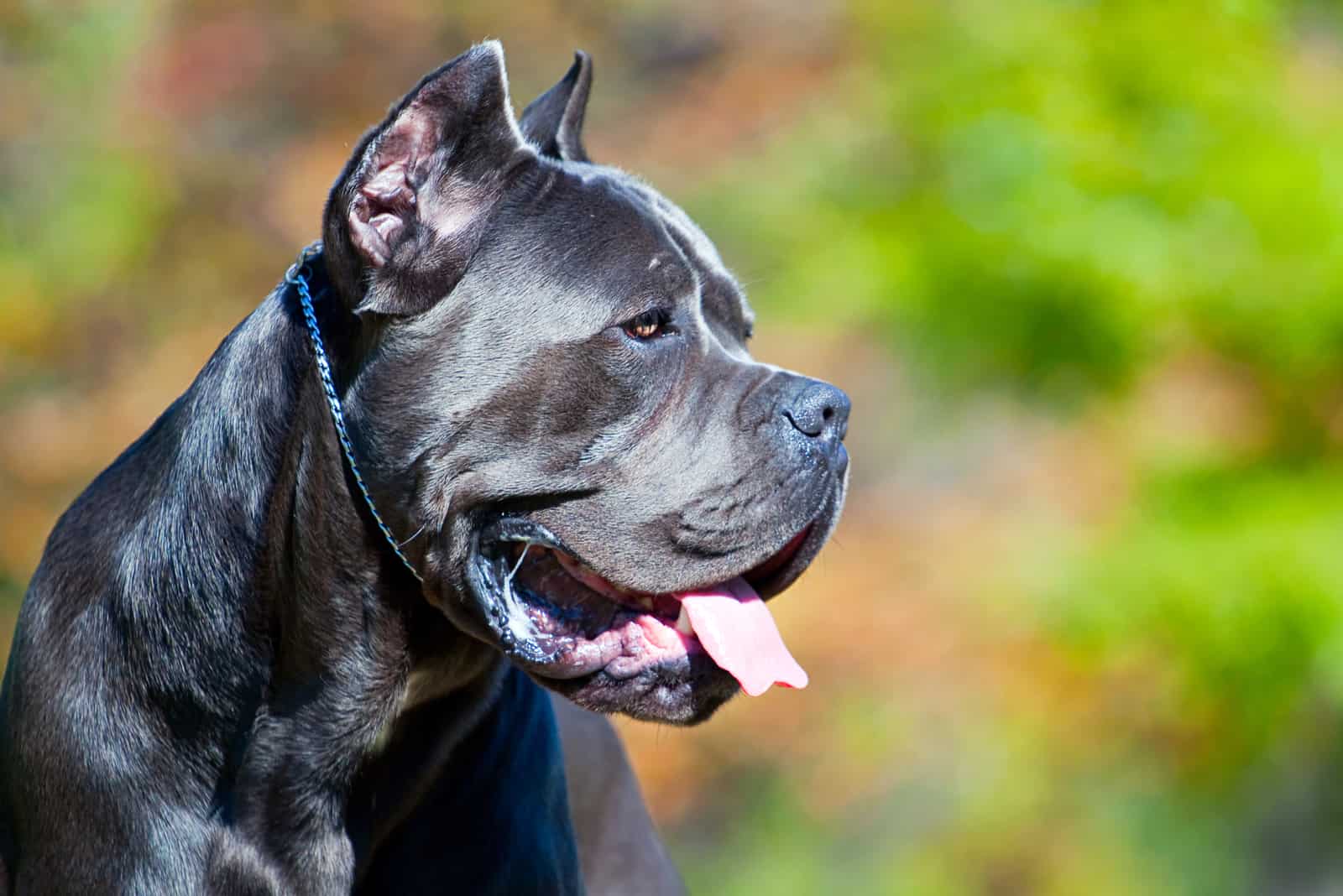
Guests are arriving and your dog starts whining and panting. The tongue is in free fall and you cannot get it to move away from the front door. Excitement is a tongue hanger for sure.
However, it could be stress too. With stress, there are other symptoms in addition to shallow breathing and whining. The pupils are usually dilated and the dog’s eyes pretty much tell you that it is stressed.
Body language makes it even easier to determine if that is the case — body tremors, tail between legs, looking around and yawning are the most common.
4. Hanging Tongue Syndrome
The cause of this syndrome is usually of anatomic or neurological nature. It is typified by the dog’s inability to completely retract the tongue inside the oral cavity.
While the syndrome itself is not harmful it carries quite a few risks that can cause additional complications. However, the syndrome can be a symptom of a more serious underlying condition.
Hanging tongue syndrome is mainly seen in brachycephalic breeds like the Pug or Cavalier King Charles spaniel. The condition can cause dry tongue, thickening of the tongue and expose the tongue to injuries such as sunburn and frostbite.
Bad breath and/or tongue cracks or bleeding can be caused by this neurological problem and, therefore, open the way to infections, injury and complications resulting from these two.
5. Underbite Or Overbite
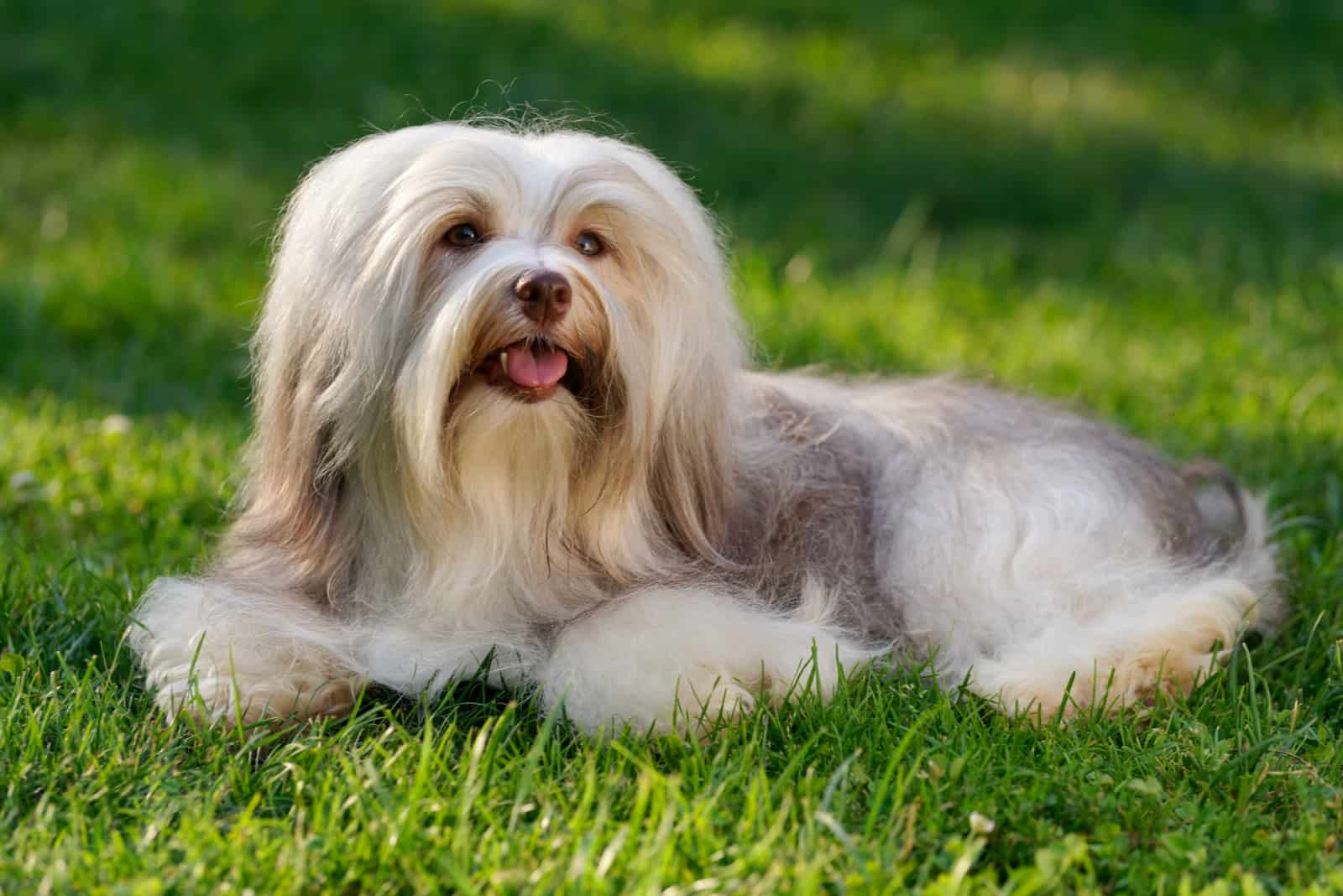
Known as canine malocclusion in medical circles, this condition causes the teeth to not align properly. The most common display is of bottom teeth being in front of the upper ones. Medical professionals refer to it as prognathia.
This bite misalignment is very common in many bloodlines of Chihuahuas. Because of its high rate of occurrence, the American Kennel Club does not consider it reason enough for disqualification.
With overbite, the opposite is true. The lower jaw is visibly shorter than the upper jaw. The medical term is brachygnathia and is very common in English bulldogs.
Both of these malocclusions can cause the dog’s tongue to stick out due to an abnormal jaw bone formation. The portion of the tongue that is hanging can vary from the tip being visible, to half or even three quarters being exposed.
While milder cases should not be a cause for concern, more serious manifestations might require several rounds of surgical procedures that can include removing mandibular teeth, crown reduction along with root canals.
The sooner the severity of the condition is determined, the better the long-term prognosis will be. Most dogs that go through these treatments have an improved quality of life later on over those who do not go through with treatment.
Needless to say, the procedures are expensive and will cost thousands of dollars to fix.
See Also: Meet 14 Most Popular Dog Breeds With Underbites
6. Missing Teeth
Certain dog breeds are more prone to having teeth or gum problems that can compromise canine teeth health. Cavities, teeth falling out due to malnutrition or underlying health issues can give space for the tongue to pop between the holes.
Periodontal disease happens in pets all the time. Bacteria in the mouth eat at the gums, bone and other structural parts of teeth, causing chronic tooth decay that ultimately leads to teeth falling out.
To be on the safe side, you should look for the following symptoms if you suspect periodontal disease: swollen gums, gum bleed while chewing, bad breath, receded gums, teeth falling out.
Dental disease is among the most common reasons your dog’s tongue sticks out. Depending on the teeth that left the chat, it can stick out from the side or front.
Keep in mind that symptoms might not be clearly visible until the disease has reached the third stage. I advise regular vet checkups to rule it out, especially if your dog’s breath smells like fish.
7. Deformations
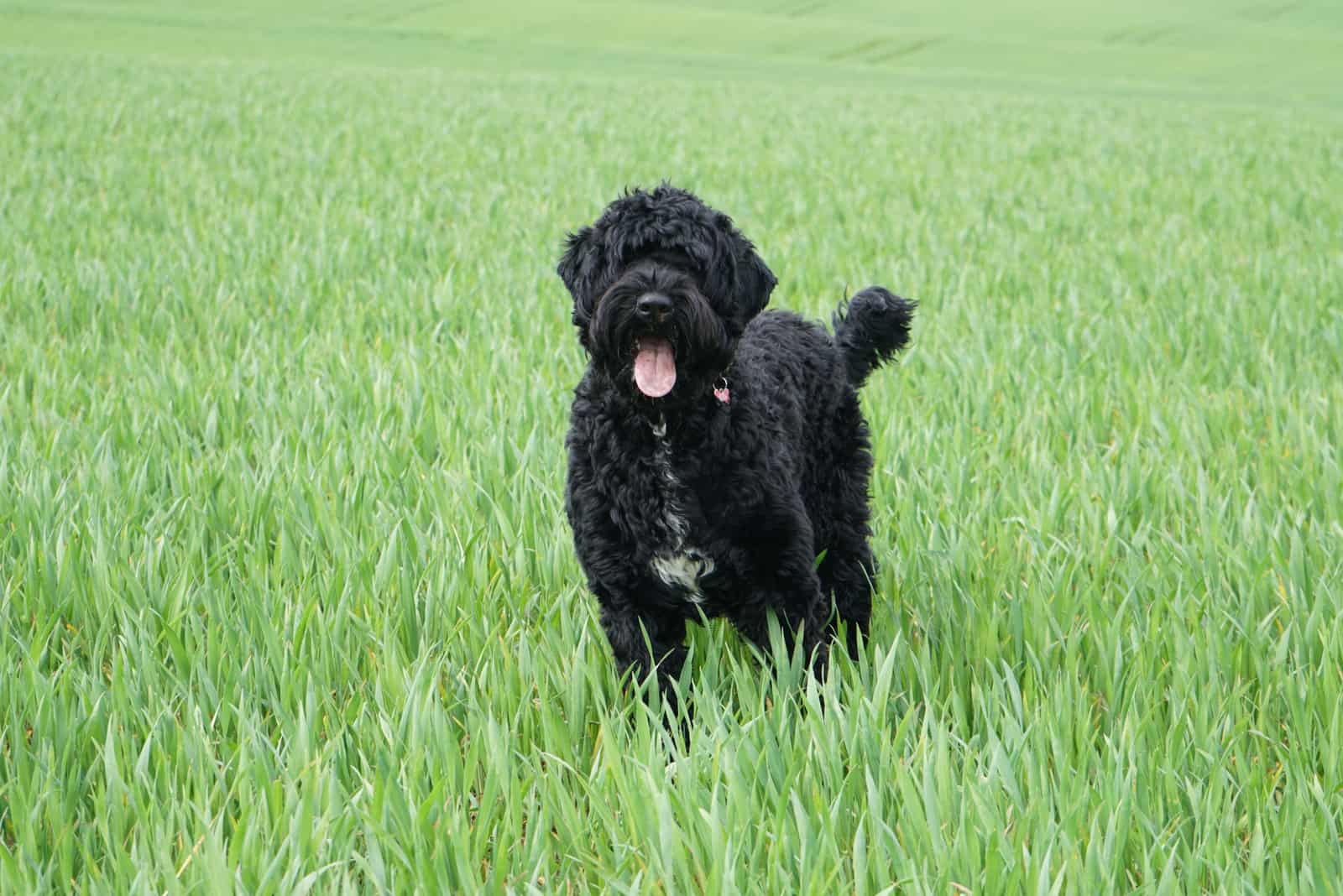
Growth anomalies or deformities that cause the dog’s tongue to stick out can occur on the tongue itself or in any of the other structures surrounding it. Pet parents should know that deformities are congenital and that, if possible, surgery can increase the dog’s quality of life.
All of these surgery options will costs thousands if not tens of thousands of dollars with the only other option being euthanasia.
Keep in mind that serious defects in puppies make their survival prognosis worse for complicated procedures. That means you could go through all the necessary surgeries and recoveries, and the dog might still not survive.
1. Ankyloglossia
Colloquially known as “tongue-tie” this condition is characterized by the dog’s tongue being attached to the lower jaw gum. The thin piece of skin called lingual frenulum should dissolve itself during the fetal phase of the dog’s life but, somehow, it remains permanently attached.
Diagnosing ankyloglossia is easy and can be visible as soon as the puppy is born. The small string of skin that keeps the tip of the tongue anchored to the floor of the mouth prevents normal movement of the tongue, and a physical mouth inspection will be enough to diagnose.
In addition to restricting tongue movement, the condition can create difficulty suckling, drinking, licking and barking. A dog with ankyloglossia has a genetic predisposition to pass on the congenital condition to its offspring, so breeding them is not suggested.
Forward protrusion of the tongue happens because the lingual frenulum folds the tongue and impedes proper breathing, swallowing etc., so that the mouth stays open and allows the tongue to settle outside the oral cavity.
The treatment is a rather simple surgery called frenotomy. It consists of cutting the ends of the frenulum and, mainly, does not involve a long recovery period. If the condition has a more complex background, then frenuloplasty is performed.
2. Macroglossia
An oversized dog tongue that transforms drinking water into a splashing water is called macroglossia. The condition is congenital and there are no known external causes for it.
If your dog’s tongue is disproportionate to its mouth size while causing your dog to have difficulties drinking, eating and barking, then you are looking at macroglossia.
All oversized tongue cases cause the organ to hang from the mouth since the oral cavity cannot hold the length of the tongue. Surgery is complex but still a possibility.
In a case of midline glossectomy, a dog’s tongue middle section was reduced to shorten the length and enable the tongue to sit more naturally on the floor of the mouth. Post-surgery care included the use of NSAIDs and a diet change to reduce swelling and allergy sensitivity.
3. Cleft Palate Or Cleft Lip
When a lack of connective tissue causes the top palate of your dog’s mouth to stay open, the nasal and oral cavity, in essence, share the same space. The gap between the two lateral parts can be a few millimeters wide or span across the entire palate.
Symptoms are rather obvious and present themselves as difficulty suckling, stunted growth, aspiration pneumonia, facial deformities, inner and middle ear issues, sinuses and teeth problems.
Cleft palate in dogs can be congenital or acquired. Congenital can be either related to bloodline genetics or external causes that affect the puppy’s mother. Vitamin A hypervitaminosis and folic acid deficiency can cause cleft palate.
Steroids, aspirin or anti-seizure medication and viral infections at a particular stage of the pregnancy are also among possible congenital causes. Acquired cleft palate develops due to trauma, cancer or periodontal disease.
Brachycephalic dog breeds like the Boston terrier, Bulldogs, Boxers and Pekingese are more susceptible to cleft palates. Miniature schnauzer, Cocker spaniel, Shih-tzu and Beagles are some of the non-brachycephalic breeds prone to the condition.
8. Injury
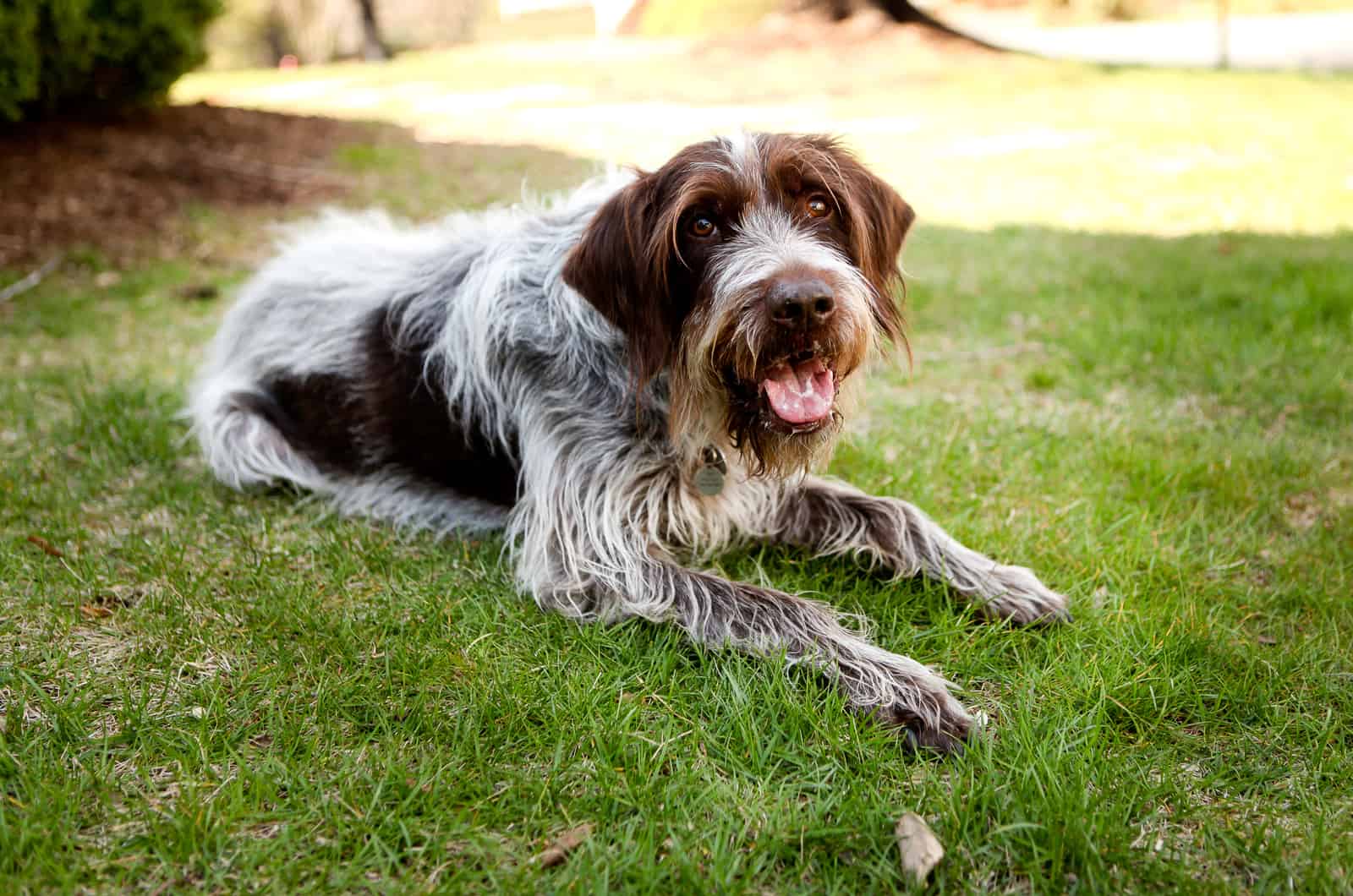
Dogs frequently do things that are not good for them. Chewing on cables plugged into the wall, climbing cabinets that can topple them, running around without being aware of their surroundings etc.
Perhaps none of those can cause that serious an injury to a dog’s body but there are scenarios that can. Car accidents can cause serious skull and facial injuries. The extent of the injury directly impacts the complexity of the treatment and recovery.
Even if the sustained injury does not immediately cause the tongue to stick out, a potential reconstructive surgical procedure might require removal of certain facial structures like muzzle, jaw, cheek etc.
Firearms often cause injuries with damage that cannot be repaired and includes saving as much good tissue as possible while potentially including large amounts of bone loss.
This can pertain to partial or complete removal of the jaw, cheekbones or muzzle, making the dog’s tongue appear as though sticking out.
Other reasons for seeing a dog’s tongue stick out can include objects that damage internal parts of the mouth so that the dog cannot retract the tongue into the oral cavity due to pain and discomfort.
Sharp, toxic or tissue degrading items and liquids that can fit a dog’s body fit the description of the previously mentioned objects. The dog’s health can be jeopardized in the long run if these symptoms are not treated or the animal rushed to an animal hospital.
Make sure you keep such items (razorblades, pointy objects that can be swallowed etc.) and liquids (detergents, cleaning products etc.) out of your dog’s reach.
9. Neurological Disorder
The most reported neurological condition in dogs are seizures. They usually cause the muscles to involuntarily contract thus disabling normal motor function of the body. A dog with epilepsy might have a seizure that causes the tongue to not be able to retract.
Mild seizures can cause permanent brain damage that may lead to irreparable harm to the synapses that control tongue movement. The cumulative effect of, sometimes unnoticed, seizures can cause the tongue to hang without the ability to retract.
Pinpointing the source of seizures is impossible at present time, but, in most cases, it is hereditary. Toxins, brain trauma, liver disease and kidney failure are some of the other causes of seizure.
Be mindful of seizure duration. If it lasts for more than five minutes and/or is followed by increased body temperature, rush your dog to an animal hospital or MVD.
The treatment will consist of intravenous anti-convulsant and a full lab and physical examination to rule out other health problems.
For dogs that have seizures that do not stop or do not react to medication, the quality of life becomes too low to be humane and putting it to sleep is recommended. If you want to know more about that check this article on when to put a dog to sleep.
10. Oral Cancer
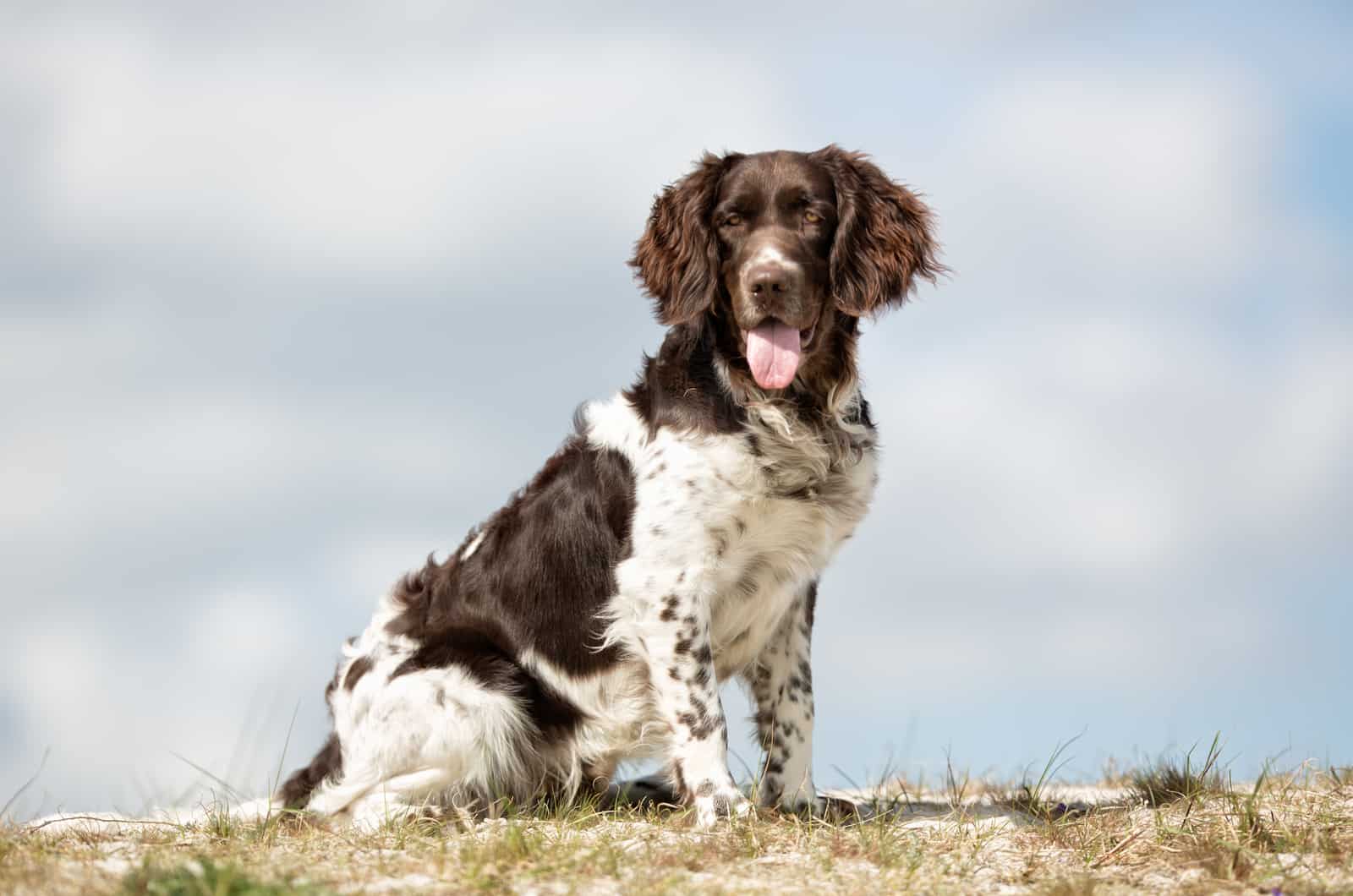
Cancers typically do not have a singular cause. Any type of cell that forms in a location only other kinds of cells replicate is called cancer. So, for example, oral cancer would be a liver cell replicating inside the dog’s mouth.
The damage cancer does to the mouth depends on whether a tumor is benign or malignant. A benign tumor will not spread and can be surgically removed with a relatively short recovery period.
A malignant tumor will spread and a combination of chemotherapy, radiation and surgery is required. Recovery is long and difficult, and the cancer can reappear at any point in time.
How does a tumor cause the tongue to hang? Well, the tumor mass can change the anatomy of the oral cavity and push the tumor outward. To facilitate “normal” breathing, swallowing and licking, the dog will involuntarily leave the tongue out of its mouth.
This behavior can become instilled in the dog’s muscle memory so even after surgery, the tongue might prefer hanging out for a period of time.
The cancer can also damage the nerves and muscles around the tongue which, in turn, can lead to partial or complete loss of motor function of the tongue.
11. Medication
I previously mentioned congenital causes of cleft lip or cleft palate and the medications that affect a puppy’s development inside the womb. There are medications that can make dogs feel “overly relaxed” and temporarily cause reduced motor function.
Finding out if medication is the reason for such symptoms should be straightforward. The meds are absorbed into the dog’s body pretty quickly and a reaction to them should follow not long after.
If you notice side effects such as involuntary pooping, droopy eyes and a more than usual relaxed tongue right after the dog has taken the medication, that could be it. Certain postoperative meds like Acepromazine often have these contraindications.
Dogs that fall asleep under the influence of this drug can have their tongue hang from the mouth as though they are unconscious. Do not worry if that is the case. The effect will wear off as the liver becomes more accustomed to filtering it out.
Doctors often prescribe melatonin for people with sleeping problems. The ASPCA has deemed it safe for usage with dogs too, and it has been used to calm dogs before administering anesthetics.
This supplement will have, more or less, the same effect on your dog as it does on humans. We all know that a fully relaxed dog means hanging tongue, so no need to panic if that happens.
Tongue In Cheek
While there are conditions that can be difficult to assess as dangerous, the most common answer to “why do dogs stick their tongue out” will be positive. Panting because it is excited or a little stressed is very common and not a reason to worry.
Many of the sources for the tongue sticking out are hereditary or congenital. Breeder choice comes into play with this one. An unregistered and shady dog breeder is more likely to sell dogs with genetic health problems.
If you adopted the dog, past trauma or external factors might have caused the tongue to hang. This is why regular checkups and prompt response in more serious cases are the best prevention for further complications.
My recommendation is that you call a vet whenever you have doubts about why your dog would have its tongue hanging out. If, for any reason, your dog starts doing this unexpectedly, a visit to the animal hospital can give you some peace of mind.
That is it for this topic. Have a healthy dog and tongues up!
Read Next:
• Dog Swollen Stomach No Pain, Causes And How To Stay Sane
• Is Black Spot On Dog Tongue Harmless Or It Can Be Dangerous?
